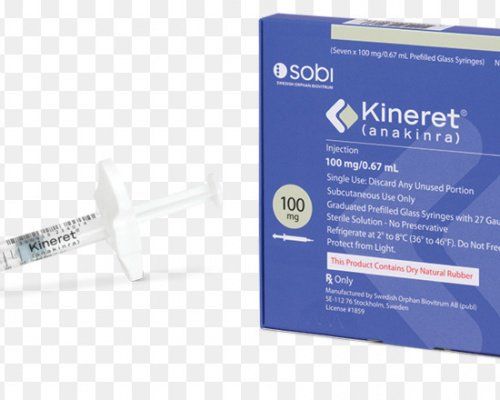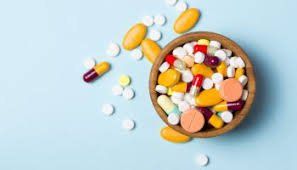This is an automatically translated article.
Hagifen belongs to the group of non-steroidal anti-inflammatory drugs, indicated for mild to moderate pain and inflammation... Let's find out the information in the following article to understand more what is Hagifen?
1. What is Hagifen?
Hagifen 400mg drug has the main active ingredient is ibuprofen and excipients just enough for 1 tablet (Tassava starch, avicel, lactose, PVP K30, talc powder, aerosil, sodium starch glycolate, HPMC, PVA, PEG 6000, titanium dioxide and orange lake color).
Hagifen is a non-steroidal anti-inflammatory drug (NSAID). It works by reducing the hormones that cause inflammation and pain in the body.
Hagifen is produced and distributed by DHG Pharmaceutical Company Limited - Vietnam. The drug is prepared in the form of film-coated tablets, packed in boxes of 10 blisters x 10 tablets.
2. What disease does Hagifen 400mg treat?
Ibuprofen is used to reduce fever, symptoms of colds and flu, and to treat pain or inflammation caused by many medical conditions such as headache, toothache, backache, arthritis, neuralgia, menstrual pain or trauma. minor injury.
2.1. Pharmacodynamic properties of the drug Hagifen 400mg In humans, ibuprofen reduces pain caused by inflammation, swelling and fever. Furthermore, ibuprofen inhibits platelet aggregation reversibly.
Experimental data suggest that ibuprofen can competitively inhibit the effect of low-dose acetylsalicylic acid on platelet aggregation when they are administered concurrently. Several pharmacodynamic studies have shown that when a 400 mg dose of ibuprofen is taken within 8 hours before or within 30 minutes of an immediate-release acetylsalicylic acid (81 mg) dose, the reduced effect of acetylsalicylic acid on with thromboxane formation or platelet aggregation occurs. Although there are uncertainties regarding extrapolation of this data to the clinical situation, the possibility that regular, long-term use of ibuprofen may reduce the cardioprotective effects of ibuprofen cannot be ruled out. low dose acetylsalicylic acid. No clinical effects are considered likely with occasional use of ibuprofen.
2.2. Pharmacokinetic properties of the drug Hagifen 400mg After oral administration, ibuprofen is rapidly absorbed and rapidly distributed in the body. Excretion occurs rapidly and completely by the kidneys. When taken on an empty stomach, maximum plasma concentrations are reached 45 minutes after oral administration. When taken with food, peak concentrations are observed after 1-2 hours. This time may vary depending on the dosage form. The half-life of ibuprofen is about 2 hours. In a limited number of studies, ibuprofen has been found in very low concentrations in breast milk.
2.3. Preclinical safety data No preclinical data on prescriber relevance were added to those included.
3. How to use Hagifen 400mg effectively?
3.1. How to use To have the best therapeutic effect, Hagifen should be taken after meals. Swallow the tablet whole with water, do not chew, crush, break, or bite. Do not take the medicine with carbonated water, beer, wine or alcoholic water.
Hagifen should take the medicine according to the instructions and prescription of the doctor. Do not arbitrarily stop using the drug even if the symptoms have disappeared. The therapeutic effect of the course may be lost if the drug is stopped abruptly.
3.2. Dosage For adults: 1 tablet/time 2-3 times a day. Do not take more than 3 tablets a day For children: Consult a doctor before giving this medicine to children. Do not arbitrarily give the child to drink without the doctor's prescription. Because Hagifen is used as needed, you may not be on a dosing schedule. If it is almost time for your next dose, do not take the missed dose, do not take two doses at the same time.
In children, taking more than 400 mg/kg may cause symptoms. In adults, dose-response effects are less pronounced. The half-life of an overdose is 1.53 hours.
Most patients who have taken a clinically significant amount of an NSAID will not experience nausea, vomiting, epigastric pain or, rarely, diarrhea. Other symptoms may include tinnitus, headache, and gastrointestinal bleeding. In more severe cases of intoxication, the central nervous system is intoxicated, manifesting as drowsiness, occasional excitability, disorientation or coma. Occasionally, patients have seizures. In severe intoxication, metabolic acidosis may occur and prothrombin/INR time may be prolonged, possibly due to interference with circulating coagulation factors that may cause acute renal failure and liver damage. Exacerbations of asthma can occur in patients with asthma.
Management should be symptomatic and supportive, including maintaining a clear airway and monitoring heart and vital signs until stable. Patients may consider oral activated charcoal if present within 1 hour of ingestion of a potentially toxic amount. If frequent or prolonged seizures occur, they should be treated with intravenous diazepam or lorazepam. Use bronchodilators for asthma.
4. Warning/caution when using Hagifen
Undesirable effects of Hagifen can be limited by using the lowest effective dose for the shortest time needed to control symptoms. Elderly patients are more likely to experience side effects with NSAIDs, especially gastrointestinal bleeding and gastric perforation, which can be fatal.
4.1. Respiratory Bronchospasm may occur in patients with a history of bronchial asthma or allergic disease.
4.2. Other NSAIDs Concurrent use of ibuprofen with NSAIDs including selective cyclooxygenase-2 inhibitors should be avoided.
4.3. SLE and mixed connective tissue disease Systemic lupus erythematosus and mixed connective tissue disease - increased risk of aseptic meningitis.
4.3. Liver and kidney Liver dysfunction. Renal failure due to renal function may worsen. There is an increased risk of kidney failure in dehydrated adolescents. 4.4. Cardiovascular and cerebrovascular effects Caution is advised (discussed with doctor or pharmacist) before initiating treatment in patients with a history of hypertension and/or heart failure because of fluid retention, Hypertension and edema have been reported in association with NSAID therapy.
Clinical studies suggest that the use of ibuprofen, especially at high doses (2400 mg/day) may increase the risk of small artery thrombosis (eg, myocardial infarction or stroke). Overall, epidemiological studies have not shown that low-dose ibuprofen (eg, ≤ 1200 mg/day) is associated with an increased risk of myocardial infarction.
Patients with uncontrolled hypertension, congestive heart failure (NYHA II-III), established ischemic heart disease, peripheral artery disease, and/or cerebrovascular disease should only be treated with ibuprofen after careful consideration and avoidance of high doses (2400 mg/day).
Care should also be taken before initiating long-term therapy in patients with risk factors for cardiovascular events (eg, hypertension, hyperlipidemia, diabetes mellitus, smoking), especially especially if high doses of ibuprofen (2400 mg/day) are required.
4.5. Impaired female fertility There is little evidence that drugs that inhibit cyclo-oxygense/prostaglandin synthesis can impair female fertility by affecting ovulation. This is reversible upon discontinuation of treatment.
4.6. Ingestive NSAIDs should be used with caution in patients with a history of gastrointestinal disease (ulcerative colitis, Crohn's disease) as these conditions may be aggravated.
Several serious events, which can be fatal, such as bleeding, ulceration or perforation of the gastrointestinal tract, have been reported with all NSAIDs at any time during treatment, with or without symptoms. warning or history of previous serious GI events.
Patients with a history of GI toxicity, in the early stages of using the drug, if any abnormal symptoms in the abdomen (especially GI bleeding) should be reported to the doctor (especially in the elderly). ).
Caution is advised in patients receiving concomitant medications that may increase the risk of ulceration or bleeding, such as oral corticosteroids, anticoagulants such as warfarin, selective serotonin reuptake inhibitors, or antiplatelet drugs such as aspirin.
4.6 Dermatology Serious skin reactions, some fatal, including exfoliative dermatitis, Stevens-Johnson syndrome, and toxic epidermal necrolysis, have rarely been reported in association with the use of this medicine. use NSAIDS. Patients appear to be at greatest risk for these reactions early in treatment (within the first month of treatment). Acute generalized exanthematous pustulosis (AGEP) has been reported in association with products containing ibuprofen. Ibuprofen should be discontinued at the first signs and symptoms of a serious skin reaction, such as skin rash, mucosal lesions or any other symptoms of hypersensitivity.
Exceptionally, chickenpox can be the source of serious skin and soft tissue infection complications. To date, a contributing role for NSAIDs in the exacerbation of these infections cannot be ruled out. Therefore, the use of Ibuprofen should be avoided in case of chickenpox.
Ibuprofen may mask the symptoms of infection, which may result in delaying the initiation of appropriate treatment and thereby worsening the outcome of the infection. This has been observed in the bacterial community of acquired pneumonia and bacterial complications to chickenpox. When Ibuprofen 400 mg tablets are used to reduce fever or pain associated with infection, infection should be monitored. In non-hospital settings, patients should consult a physician if symptoms worsen or persist.
5. Interactions with other medicinal products
To use the drug safely, patients should not combine Ibuprofen with some of the following drugs:
Acetylsalicylic acid: Unless a low dose aspirin (no more than 75mg per day) has been recommended by your doctor. The concomitant use of ibuprofen and acetylsalicylic acid is generally not recommended because of the potential for increased side effects. Experimental data suggest that ibuprofen can competitively inhibit the effect of low-dose acetylsalicylic acid on platelet aggregation when they are administered concurrently. Although there are uncertainties regarding extrapolation of these data to clinical status, the possibility that frequent, long-term use of ibuprofen may reduce the cardioprotective effects. of low-dose acetylsalicylic acid. Without regular use of ibuprofen, no clinical effects are thought to be likely for the user. Other NSAIDS including selective cyclo-oxygenase-2 inhibitors: Avoid concomitant use of two or more NSAIDs as this may increase the risk of side effects. Anticoagulants: such as warfarin because NSAIDs can enhance the effects of anticoagulants used in combination. Antihypertensives and diuretics: The effect of NSAIDs is that they may reduce the effect of these drugs and increase the risk of nephrotoxicity. Corticosteroids: Increased risk of gastrointestinal ulceration or bleeding. Selective serotonin reuptake inhibitors (SSRIs) and antiplatelet agents: Increased risk of gastrointestinal bleeding. Cardiac Glycosides: The effects of NSAIDs may aggravate heart failure, decrease GFR and increase plasma glycoside levels. Lithium: There is evidence in studies of an effect on increasing plasma concentrations of lithium. Methotrexate: Potential to increase plasma methotrexate. Ciclosporin: Increased risk of nephrotoxicity. Mifepristone: NSAIDs can reduce the effect of mifepristone, so NSAIDs should not be used for 8-12 days in a row. Tacrolimus: As with diuretics and antihypertensives, NSAIDs in combination with tacrolimus can cause nephrotoxicity. Zidovudine: Using NSAIDs with zidovudine increases the risk of bacterial infection. There is evidence of an increased risk of coagulopathy and hematoma in HIV (+) hemophilia treated concomitantly with zidovudine and ibuprofen. Quinolone antibiotics: Animal experiments have shown that NSAIDs may increase the risk of seizures (associated with quinolones).
Please dial HOTLINE for more information or register for an appointment HERE. Download MyVinmec app to make appointments faster and to manage your bookings easily.













